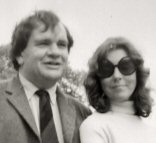
Listen to The Immortal Part (XLIII), recorded in 1996, at the Housman Society's celebration of the centenary of A Shropshire Lad. (See below) (qqq).
Stoppard's Invention of Love opens with Housman's death, and a comic dialogue with the grim ferryman.
Charon grumbles that he was expecting two gentlemen, a poet and a classical scholar.
Both aspects of Housman are presented in +Christopher Ricks's Collected Poems and Selected Prose, Penguin 1988.
A Shropshire Lad google gives 5,000 hits; adding Housman cuts it down to 2,500. Housman did not know Shropshire well, but he could see it from Bromsgrove.
1996 was the centenary of the publication of A Shropshire Lad, and the Housman Society (everyone has a society in England) held a complete reading of it to mark the occasion.
My part in this was to read XLIII, The Immortal Part.
You can
Hear me doing it.
if you've got Media Player or Real Player installed, or
Install it now - the free version is the right-hand button).
Ho Ho. Like Alvar
Liddell in the war: "Here is The Immortal Part, and this is John Wheater
reading it".
You can also
Hear Richard Sater
, an American, reading the same poem. See how they compare.
Eat your heart out, Richard...
Most of us are not classical scholars, and think of AEH as mainly a poet. But this is wrong. As a scholar his star will shine brightly for ever, with Bentley and Porson for example. He said himself that the building of this eminence was the purpose of his whole life. It demanded intense and prolonged work, illustrated by his being the only man ever to be appointed to a major professorship (at University College London) without having even a first degree. He had worked, and published, in his spare time, to such purpose, that he triumphed. Then, later, on to the Kennedy professorship at Cambridge, where he stayed for the rest of his life.
So, yes, we know him as a poet, and a superb poet he is. But, he is not even a contender in the struggle to be a major poet; he would have laughed, and maybe did laugh, at any suggestion that he be thought of in the same breath as Shakespeare, Milton, Coleridge, Tennyson, and a few others. Though, mind you, he didn't think much of Hopkins, since elevated to stellar status.
He is, then a minor poet, and Adrian, a distinguished classicist, was quite wrong when he suggested recently that AEH saw his poetics as more important than his scholarship. He knew exactly where he was placed in both leagues.
Housman's life bridged two others of interest and importance:
When he himself was an undergraduate, he attended lectures by
Ruskin, who
delivered anathemas (illustrated with Turner's pictures, particularly
that of Leicester Cathedral) on industrial progress (see Ricks, above).
Years later, when Housman was a professor, his own lectures were attended
by
Enoch Powell, who became the world's youngest
classics professor just before
World War Two.
I'd recommend anyone approaching AEH for the first time to dip randomly into either of the two slim volumes, A Shropshire Lad and Last Poems, which were his only poetry published while he lived. You'll see a simple, even naive, little jingle. But don't discard it yet. Note the careful structure, the rhyming scheme. Then go to one of the stars, say "On the idle hill of summer", ASL XXXV ( here). Then close the book (or switch the screen), try recalling the ideas and how they fitted in. Then go back to the poem, and know him for a (B sharp minor) poet. If still interested, have a look at the lecture he gave, late in life, on The Name and Nature of Poetry. (Quote: "Even when poetry has a meaning, as it usually has, it may be inadvisable to draw it out . . . Perfect understanding will sometimes almost extinguish pleasure"). It's in Ricks's book, and, Reader, if you've got thus far, my job is done.